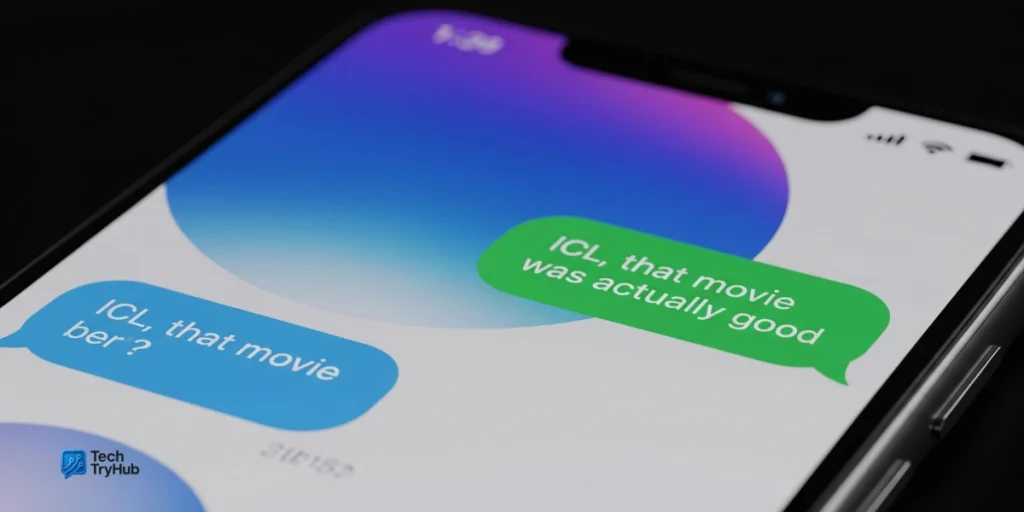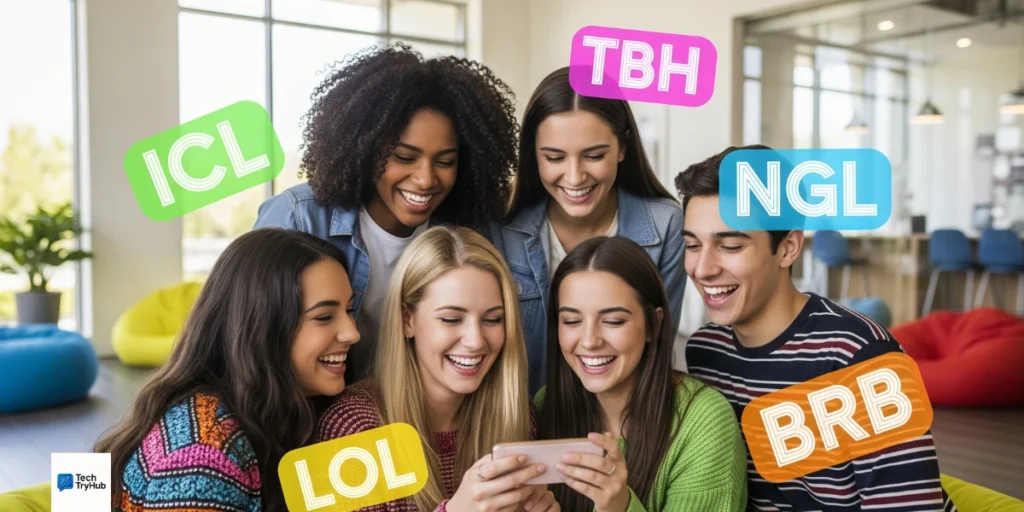Introduction
I remember scrolling through my messages the other day, and I saw “ICL, that movie was fire.” My first thought: “Wait what does ICL even mean?” You’re not alone many of us see acronyms bubbling up in chats and captions, and we’re left scratching our heads.
So here’s the question: what does ICL mean in text, really and how do you spot its tone and use it without sounding forced? In this article, we’ll dig into its meaning, how people use it across platforms, potential pitfalls, alternatives, and tips so you don’t misread or misapply it.
Let’s go.
The Core Meaning: “I Can’t Lie”
What it means & how people use it
The dominant and most widely cited meaning of ICL is “I can’t lie.”
When someone types “ICL,” they’re prefacing what follows with a claim to honesty. It’s like saying, “To be real with you…” or “Honestly…” but in a shorthand way.
Example usage:
- “ICL, that new show was better than I expected.”
- “ICL, your outfit slaps.”
- “ICL, I’ve been feeling anxious lately.”
Because “I can’t lie” is more direct than “to be honest,” using ICL often gives a slightly stronger, more candid tone.
Validation across sources & platforms
- Blendspace notes that “ICL is an acronym with several meanings, one of them being ‘I can’t lie’,” and that this usage is especially popular across social media and texting.
- Distractify explicitly positions ICL as parallel to “NGL (not gonna lie),” reinforcing that ICL is simply a variant used when someone wants to drop a truth.
- Tech4States and RizzLane both present ICL = “I can’t lie” as the default meaning when people ask “what does ICL mean in text.”
Mini takeaway:
ICL almost always means “I can’t lie” in casual text usage. If you see it in a conversation, assume it signals honesty unless context strongly suggests otherwise.

Secondary Meanings & Less Common Uses
Though “I can’t lie” is king, ICL isn’t limited to one meaning. Some of these alternate interpretations show up among niche communities, jokes, or creative text play.
Other possible meanings
- “I care less” (a variant that implies indifference)
- “I chuckled lightly” or “I cried laughing” in playful or exaggerated usage
- “In Christian Love” in religious or faith-oriented messages
- “In Cyber Life” in more abstract or online context references
These alternate meanings are rare and tend to appear in playful or ironic contexts rather than serious messaging.
Why multiple meanings matter
Because ICL has potential meanings beyond “I can’t lie,” context is everything.
- Tone of conversation: If someone is joking, the meaning might be one of the playful variants.
- Platform & culture: In niche forums or subcultures, they might appropriate ICL differently.
- Sentence structure: If “ICL” is used mid-sentence in a humorous sentence, it might lean toward “I chuckled lightly.”
If you’re unsure, default to “I can’t lie,” but stay alert if something feels off, double-check by how the rest of the message is written.
ICL in Slang Trends: TS, PMO, ICL
In many trending TikTok captions, memes, or comment chains, you’ll see TS, PMO, and ICL grouped together. For example: “TS PMO ICL…”
What are TS and PMO?
- TS often stands for “this shit” or “that shit” a shorthand people use as a filler or emphasis.
- PMO can mean “piss me off” or “put me on” depending on context.
In a meme or brainrot post, someone might drop all these together for effect, not necessarily intending cohesive meaning. Claiming “TS PMO ICL” can just be part of the aesthetic, not a phrase with a strict literal translation.
Why this trend matters
Seeing ICL in such groupings shows how slang evolves beyond literal meanings. It’s not just about what the words are but the vibe, tone, and resonance they collectively create. If you want to use ICL in such slangy combos, make sure you’re familiar with the surrounding environment these are rarely used in formal or serious conversation.
Mini takeaway:
When you see ICL paired with TS or PMO, don’t overread it. It’s often about trendiness or humor more than precise meaning.
How to Use ICL Safely & Effectively
If you want to sprinkle ICL into your texts, DMs, or posts, here are guidelines and examples to keep you sounding natural (not forced).
When it’s appropriate
- Casual chats with friends
- Social media captions or replies
- Lighthearted comments or mild critiques
- Flirty or expressive texts (where tone is playful)
When to avoid it
- Formal or professional writing (emails, reports)
- Sensitive conversations (mental health, serious topics)
- With people who may not know the slang
- In ambiguous messages where sincerity is critical
Examples & misuse traps
Good use:
- “ICL, that concert was lit.”
- “ICL, I’m nervous about tomorrow’s exam.”
Risky / awkward use:
- In a work Slack message: “ICL, I thought your idea sucked.” (too blunt)
- In an apology: “ICL, I messed up.” (may seem weak or insincere)
Tips to make ICL feel natural
- Use it at the start or end of a message.
- Don’t overuse it too many ICLs dilute the honesty.
- Follow it with genuine content (your point should match the claim of honesty).
- Match the tone: if you’re joking, make it obvious (emojis, sarcasm cues).
- Read the room if you’re messaging someone unfamiliar with Gen Z slang, skip it.
Mini takeaway:
ICL works best when you’re aiming for casual candor. Use it sparingly, align your tone, and avoid it in contexts where sincerity or clarity matters most.
How to Recognize & Interpret ICL When Someone Else Uses It
When someone drops ICL in a message to you, here’s how to interpret it accurately:
- Check placement & tone
If ICL starts the message, it likely prefaces an opinion. If it’s at the end, it might underscore sincerity. - Look at what follows
Does the statement feel honest, joking, or exaggerated? That helps you pick between “I can’t lie” (default) or something playful. - Account for relationship & context
If it’s a close friend, they might be exaggerating. If it’s someone you don’t know well, they may be playing safe with tone. - Don’t overreact to ICL itself
Just because someone says “ICL, I liked your photo” doesn’t mean they’re confessing deep feelings sometimes it’s just a friendly way to say “I actually mean this.”
Mini takeaway:
ICL is a marker, not the message. Focus more on the rest of what’s said and use context and tone to interpret the meaning.

Alternatives & Comparable Slang
Knowing alternatives gives you flexibility. Here are some you’ll see often (and when to use each).
| Slang / Phrase | Meaning / Tone | Example |
|---|---|---|
| NGL (Not Gonna Lie) | Very close to ICL, slightly more casual | “NGL, that was stronger than I expected.” |
| TBH (To Be Honest) | More formal, less edgy | “TBH, I didn’t love the ending.” |
| No cap | Emphasizes truth / seriousness | “That party was amazing, no cap.” |
| FR (For Real) | Emphasis, affirmation | “FR, I’m starving right now.” |
| Honestly / Truth be told | More formal | “Honestly, I wasn’t ready for that twist.” |
By using the right phrase in the right tone, you can adapt for different audiences friends, social media, semi-formal settings.
Mini takeaway:
ICL is one tool among many. If it fits, use it; if not, fall back on TBH, no cap, etc., to match your style.
Example: A Day in Chat Using ICL
Let me walk you through a mini scenario so you see how ICL naturally fits.
Chat with a friend
- Friend: “How was the concert last night?”
- You: “ICL, it was fire. Best live show I’ve seen in months.”
- Friend: “Dude, you’re exaggerating lol. What about the opening act?”
- You: “ICL, opening act was weak. Could barely hear them.”
Here, ICL helps you express opinion with emphasis, yet still sounds casual and honest. Without it, the message might sound bland or less authentic.
Common Mistakes & Misunderstandings
Here are traps people fall into avoid them.
- Overusing ICL: if every other sentence starts with ICL, it loses impact.
- Using in serious, formal contexts: drops professionalism.
- Misinterpreting alternate meanings: assuming “I care less” when someone meant “I can’t lie.”
- Ignoring tone or sarcasm: someone might say “ICL, that joke is hilarious” sarcastically but you can misread sincerity.
Trend & Popularity: How Often It’s Searched
- A survey in Texas listed ICL among the most confusing text slang (with “PMO” and “OTP”) meaning many people still look it up.
- In the Glossary of 2020s Slang on Wikipedia, “icl” is explicitly defined as abbreviation of “I can’t lie.”
- KnowYourMeme traces how “TS PMO ICL” conglomerations gained traction and how slang overload plays a role in creating viral memes.
These data points suggest that knowing slang like ICL isn’t lightweight it’s part of how people stay linguistically current online.
Quick Guide: When & How to Use ICL (Checklist)
- Use when chatting with peers or in informal settings
- Place it at start or end of statement
- Follow it with an honest or opinionated sentence
- Avoid in formal, professional, or sensitive communication
- Don’t use it so often that it becomes cliché
- Pay attention to tone, punctuation, emojis they help your meaning land right
Conclusion: What does icl mean in text
So, circling back: what does ICL mean in text? In almost every casual conversation online, it means “I can’t lie.” It’s a shorthand way to flag honesty, a tool to make your voice sound more real and relatable. But like any slang, context is king. Watch tone, don’t overuse it, and match your audience.
If you found this breakdown helpful, share it with friends who cringe at slang. And if you ever spot someone using “ICL” in a weird or confusing way come back here and check your context before assuming.
Your digital slang game just got stronger. Now go ahead and drop that ICL in your next chat just use it wisely.
FAQ
Q1. What does ICL mean in text messages?
ICL means “I can’t lie.” It’s used to preface or emphasize honesty or sincerity in a casual message.
Q2. Is ICL the same as NGL?
Pretty close. NGL means “Not gonna lie,” and ICL means “I can’t lie.” The nuance is small ICL may read slightly more direct or forceful.
Q3. Could ICL ever mean “I care less”?
Yes, in rare situations. But that usage is uncommon and usually depends on context or playful tone.
Q4. Can I use ICL in work communications?
Better to avoid it in formal or professional communications. In informal team chats where slang is accepted, perhaps—but use with caution.
Q5. Why do people use ICL instead of “honestly”?
It’s faster, trendier, and signals you’re speaking your real thoughts. In digital communication, shorter = more natural.
Q6. Is the trend of ICL growing?
Yes slang trackers and glossary sites list “icl = I can’t lie” as part of current 2020s slang, and it appears in TikTok/Instagram usage.